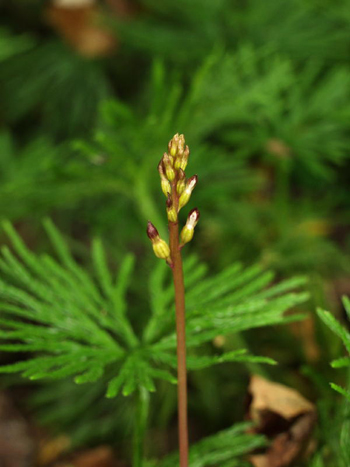Contents:
Common Names | Parts Usually Used | Plant(s) & Culture | Where Found | Medicinal Properties
Legends, Myths and Stories | Uses | Formulas or Dosages | How Sold | Bibliography
Scientific Names

- Corallohiza odontorhiza L.
- Orchid family
Common Names
- Chickentoes
- Crawley
- Crawley root
- Coral
- Dragon’s claw
- Fever root
- Scaly dragon’s claw
- Turkey claw
Parts Usually Used
Rootstock
Back to Top
Description of Plant(s) and Culture
Coral root is a native American, perennial plant; this singular, leafless plant has a collection of small, fleshy tubers as roots; the dark brown, branched, toothed, coral-like underground rootstocks send up simple scapes with sheaths instead of leaves; the coral-like stalk is pale yellow with a covering of a sort of sticky wool and scales, answering for leaves, and with terminal racemes of 3-20 flowers. The hood-like flowers are reddish or purplish on the outside, paler and flecked with purple lines on the inside. One petal forms a white lip with purple spots and a purple rim. Flowering time is August to October. The fruit is a large oblong capsule. The plant grows 10-20 inches high and depends on roots of trees and the rich soil of the woods for survival; it has a strong nitrous smell, and mucilaginous slightly bitter, astringent taste.
Back to Top
Where Found
It grows around the roots of trees in dry woodlands from Maine to Minnesota and south to Georgia, Alabama, Mississippi and Missouri.
Back to Top
Medicinal Properties
Diaphoretic, febrifuge, sedative
Back to Top
Legends, Myths and Stories
Coral roots are a brownish, chlorophyll-lacking group of orchids, found growing on leaf mold in rich woods throughout the United States. It takes a careful eye to find them. Its scarcity and high price have prevented its general use.
Back to Top
Uses
An effective remedy for skin diseases, scrofula, boils, tumors, fever, acute erysipelas, cramps, pleurisy, night sweats, and highly recommended for cancer. Good for varicose veins. Dip a cloth in the tea and apply externally.
Valuable in typhus and inflammatory diseases. Combined with blue cohosh for scanty or painful menstruations. For insomnia take the tea before retiring for the night. Native Americans used the tea as a blood thinner.
Back to Top
Formulas or Dosages
Infusion: steep 1 tsp. rootstock in 1 cup water. Take hot or cold, 1 to 2 cups a day.
Tincture: take 10-20 drops at a time.
Back to Top
How Sold
Available in a tincture; directions on the label.
Back to Top
Bibliography
![]() Back to Eden
Back to Eden, by Jethro Kloss; Back to Eden Publishing Co., Loma Linda, CA 92354, Original copyright 1939, revised edition 1994
![]() The Herb Book
The Herb Book, by John Lust, Bantam Books, 666 Fifth Avenue, New York, NY. copyright 1974.
![]() Eastern/Central Medicinal Plants
Eastern/Central Medicinal Plants, by Steven Foster and James A. Duke., Houghton Mifflin Company, 215 Park Avenue South, New York, NY 10000
![]() Planetary Herbology
Planetary Herbology, by Michael Tierra, C.A., N.D., O.M.D., Lotus Press, PO Box 325, Twin Lakes. WI 53181., Copyright 1988, published 1992
![]() Indian Herbalogy of North America
Indian Herbalogy of North America, by Alma R. Hutchens, Shambala Publications, Inc., Horticultural Hall, 300 Massachusetts Avenue, Boston, Massachusetts 02115, 1973
![]() Webster’s New World Dictionary
Webster’s New World Dictionary, Third College Edition, Victoria Neufeldt, Editor in Chief, New World Dictionaries: A Division of Simon & Schuster, Inc., 15 Columbus Circle, New York, NY 10023
